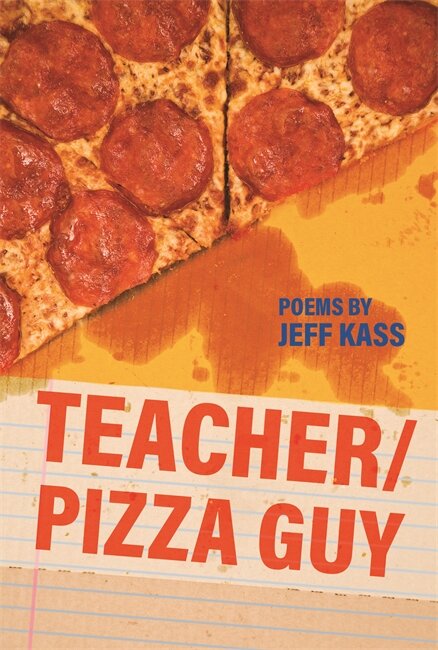Teacher/Pizza Guy
Jeff Kass
Wayne State University Press $16.99
Reviewed by Valerie Wieland
Jeff Kass picked a catchy title for his fourth book: Teacher/Pizza Guy. If you’ve hesitated to pick up a book of poems because of the quirky shapes and affectations that complicate much of contemporary poetry and might even exhaust anyone trying to make sense of it, hesitate no more.
Kass’s poems glide effortlessly between teaching during the 2016-17 high school year and moonlighting in a pizzeria. Along the way, however, he does employ some literary devices. One presents in “Young man, take your headphones out,” an anaphora that begins each stanza with the poem’s title sentence. Elsewhere, he writes what is obviously a sestina in “Sestina for the segregated class,” weaving the word “task” throughout the poem:
It seems impossible, a ferocious task—
to compel the white girls crackling in the corner
to connect to the stoners huddled on the couch to the left,
. . . . . . . . . . . . . . . . . . . . . . . . . . . . . . . . . . . . . . . . . .
I want the world to work without a seating chart in its middle,
but the class grows no closer as we muddle from task to task. (lines 1-3; 7-8)
In a separate vein, look at how Kass empathizes with the apprehension and uncertainness teenagers experience. In “Today for the first time I notice,” he remembers a girl who committed suicide several years ago: “It’s a hard thing, high school. / I’ve been teaching twenty-one years, and still // don’t really understand how it works” (lines 27-29). Follow that with these lines from “Another school year, another email,” in which a more recent student’s death is most likely suicide:
I think of him mostly as quiet, chin cocked slightly upward,
eyebrows knitted, thinking. He owned the stage one year
in the poetry slam, made a whole auditorium chortle
at his story of catching his thumb in a car door. He wanted
to be in love.
I wanted him to be in love too. I want all my students to be
in love, so deep and viscous they can’t focus in class and my words
sound like trucks backing up, beeping through their bliss. Choose
the bliss. Choose it over anything else I try to teach you. I await
now the next email, letting me know funeral arrangements. etc. (lines 5-12)
It’s my belief that parents today face more difficulties raising their offspring than when my children were growing up. With the ever present, frequently conflicting advice shouted from every medium, the path to good parenting gets foggy. Kass’s poem titled “A colleague says sometimes he thinks anyone who’s been married more than five years deserves a medal” contains these telling lines about shielding children from facing responsibility:
. . . . . . . . . . . . . . . . . . . . . . . . . . . . . . . I failed to prepare
the lesson I’m teaching today. It’s a new one, not recycled.
We’ll read a long poem about parents cheering when their
children suck at basketball, how mothers and fathers unite
the bleachers to conjure a robust cloud of love. (lines 23-26)
Switching gears, Kass began his gig as a pizza guy when he was 50 years old. He not only delivered tasty pies, but also performed kitchen duty, describing his first-day confusion in “It’s Strange”: sauce stained buckets and pans “stacked like towers of tires / . . . sponges and steel / wool and three different sinks, but you have / no idea what to do next” (lines 6, 8-10).
Oh, and did I mention that his manager was a former student?
An entire chapter is devoted to a poem titled “The crime,” which involves two drunk blondes, a pajama-clad woman named Carissa, and giraffes. It’s one of my favorites as it leads Kass to philosophize and ask, “who can we trust?” (line 110).
Off the criminals scuttle, the tip is two bucks,
and, yes, I am as naïve as an eight-year-old
ordering sea monkeys from the back of a comic book. (lines 44-46)
I was momentarily thrown off reading Kass’s pieces by his occasional use of run-on sentences. In “The manager talks about getting engaged,” a 22-line sentence followed almost immediately by a 14-line sentence had me, at first, looking at punctuation rather than following the poem’s flow.
But that was just the tiniest blip on my enjoyment of Jeff Kass’s Teacher/Pizza Guy. His book is an extremely readable, often funny, sometimes serious look at one man’s perspective on the all-too-common, multifaceted lives of teachers today.
Valerie Wieland is the author of the poetry collection The Language of Snow and Ice. Her book reviews have regularly appeared online and in print. Other works have been published in Front Range Review, Hiram Poetry Review, Buffalo Spree Magazine, Hawaii Review, SportLiterate, Cape Cod Life, Seems, Eureka Literary Magazine, Vietnam, Kaleidoscope, and elsewhere.

